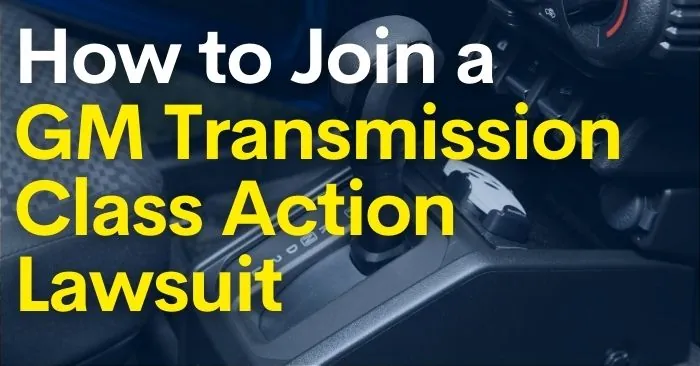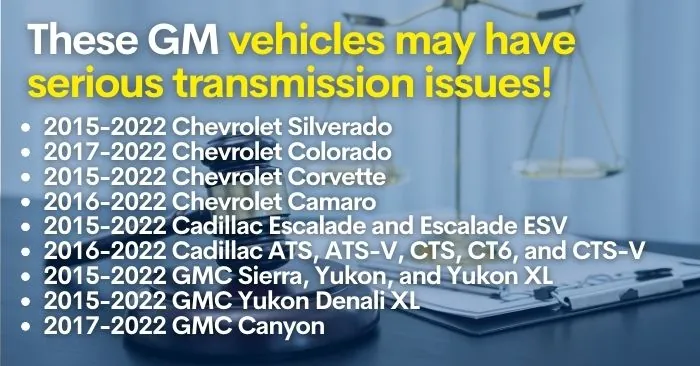Legally reviewed by: Jessica Anvar Stotz, JD, MBA

If you live in California and are considering joining a General Motors Transmission Class Action Lawsuit, it’s essential to pause and weigh your options carefully.
While joining the lawsuit may seem like a straightforward route to compensation, it is worth noting that there are alternatives that could potentially yield far more in compensation. One such alternative is pursuing a Lemon Law claim, which could result in a more substantial payout for vehicle defects.
There are currently two ongoing class actions encompassing a wide range of 2015-2022 GM vehicles, including select GMC, Cadillac, and Ford vehicles. Before committing to the class action route, take the time to consider all options and make an informed decision that best serves your interests and protects your rights as a consumer.
| Class Action Deadline | Class Action Counsel | Class Action Details |
| TBA | Capstone Law APC | Owners or lessees of specified 2015-2019 GM vehicles equipped with 8L90 or 8L45 transmissions, manufactured between 2015 and March 1, 2019, are eligible. |
| TBA | Cohen Milstein Sellers & Toll PLLC | Owners of specified 2019-2022 GM vehicles with 8L transmissions manufactured after March 1, 2019, across 26 states are eligible. |
Which GM Owners Are Eligible to Join
If you own or lease certain General Motors (GM) vehicles with the 8L90 or 8L45 eight-speed automatic transmissions, manufactured within specific dates, you may be eligible to join the class action lawsuits.
For the first lawsuit led by Capstone Law APC, eligible vehicles include models like the Chevrolet Silverado, Colorado, Corvette, Camaro, Cadillac Escalade, ATS, CTS, and GMC Sierra, among others, manufactured between 2015 and 2019.
The lawsuit alleges that GM failed to disclose defects in these transmissions, resulting in safety risks for drivers. For more information, contact Capstone Law APC at 888.622.6117 or email [email protected].
Similarly, the second lawsuit represented by Cohen Milstein Sellers & Toll PLLC covers GM vehicles with 8L transmissions made after March 1, 2019 (model years 2019-2022), across 26 states.
Owners of these vehicles may be eligible to join the lawsuit, which alleges that GM failed to disclose defects in the transmissions, posing safety risks to drivers. To confirm eligibility, check if your vehicle has one of the specified transmissions and falls within the designated manufacturing timeframe. For more information about this lawsuit, individuals can contact Cohen Milstein Sellers & Toll PLLC.

7 Steps to Join the GM Transmission Class Action Lawsuit
By following these steps, you can take the necessary actions to join the GM Transmission Class Action Lawsuit and potentially seek compensation for any damage caused by the manufacturing defects in your vehicle.
- Review Eligibility: Determine if you qualify to join the lawsuit based on your ownership or lease of a qualifying vehicle with a General Motors Hydra-Matic 8L90 or 8L45 transmission manufactured between specific dates.
- Gather Documentation: Collect any relevant documents related to your vehicle ownership or lease, such as purchase or lease agreements, service records, and correspondence with GM or dealerships regarding transmission issues.
- Contact Legal Representation: Reach out to the law firm handling the class action lawsuit, such as Capstone Law APC or Cohen Milstein Sellers & Toll PLLC, to express your interest in joining the case. You can contact them via phone or email to initiate the process.
- Provide Information: Be prepared to provide details about your vehicle, including its make, model, year, VIN (Vehicle Identification Number), and any transmission-related problems you’ve experienced.
- Follow Instructions: Follow any instructions provided by the legal team regarding documentation submission, filling out forms, or other necessary steps to formalize your participation in the lawsuit.
- Stay Informed: Stay updated on the progress of the lawsuit by regularly checking for updates from the law firm or official court documents. This will keep you informed about any developments or requirements related to your involvement in the case.
- Seek Legal Advice: If you have any questions or concerns about joining the class action lawsuit, consider seeking legal advice from an attorney specializing in consumer protection or class action litigation. They can provide guidance tailored to your specific situation.
Pros and Cons of Joining this Class Action
Joining the GM Transmission Class Action Lawsuit as a Californian presents an opportunity to seek compensation for issues related to faulty transmissions, while also uniting with others impacted by similar concerns.
By joining forces, individuals can collectively address corporate negligence and potentially recoup expenses incurred due to transmission problems. Class action lawsuits have inherent uncertainties and limitations, however, which may result in less favorable individual payouts after legal fees and other expenses are deducted.
Please be aware that joining entails giving up some control over case decisions, which are typically made by a small group of lead plaintiffs and their attorneys.
This could limit individual participation in the litigation process, emphasizing the importance of weighing potential benefits against the risks and complexities involved. Individuals must ultimately make an informed decision based on their unique circumstances and priorities, while keeping in mind that participating in a class action lawsuit may not always result in optimal financial outcomes.
Why Pursuing a Lemon Law Claim Can Be a Better Financial Option
While joining a class action lawsuit might seem like the most accessible route to seeking compensation for transmission issues, exploring the option of pursuing a Lemon Law claim could potentially offer a more favorable financial outcome for Californians.
Under California’s Lemon Law, consumers are entitled to a refund or replacement vehicle if their car experiences significant defects that substantially impair its use, safety, or value, and the manufacturer fails to repair the issues within a reasonable number of repair attempts. Here’s why opting for a Lemon Law claim may be advantageous:
- Direct Resolution: Unlike the lengthy and uncertain timeline of a class action lawsuit, Lemon Law claims typically proceed more swiftly. With a Lemon Law claim, you’re directly addressing your concerns with the manufacturer, potentially leading to a quicker resolution.
- Full Compensation: Lemon Law remedies often provide more comprehensive compensation than what might be obtained through a class action lawsuit. Depending on the specifics of your case, you could be eligible for a refund of your vehicle’s purchase price or a replacement vehicle, along with reimbursement for associated expenses like repairs, towing, and rental car costs.
- Individualized Attention: By pursuing a Lemon Law claim, you’re advocating for your specific situation, rather than being one among many in a class action. This personalized approach may result in a more tailored resolution that better addresses your needs and losses.
- Legal Support: While class actions typically involve shared legal representation, pursuing a Lemon Law claim allows you to work directly with an attorney who can provide dedicated support and guidance throughout the process. This personalized assistance can be invaluable in navigating the complexities of Lemon Law regulations and negotiating with manufacturers.
- Preservation of Rights: Opting for a Lemon Law claim preserves your right to pursue legal action independently if the manufacturer fails to comply with Lemon Law requirements. Unlike joining a class action, which may limit your options for seeking additional recourse, pursuing a Lemon Law claim keeps all avenues open for potential redress.
In weighing the financial implications of joining a class action lawsuit versus pursuing a Lemon Law claim, Californians facing transmission troubles should carefully consider the potential benefits and drawbacks of each option.
While class actions offer collective strength and shared resources, Lemon Law claims provide a more direct path to individualized compensation and resolution. Ultimately, the decision should align with your priorities, goals, and the specific circumstances of your case.
GM Transmission Class Action Lawsuit Deadlines
For those considering participation in the GM Transmission Class Action Lawsuits, it’s vital to be aware of the associated deadlines to ensure timely action. Failure to meet deadlines could result in missing out on the opportunity to participate in seeking potential compensation for transmission-related issues. Stay informed and proactive to protect your rights and interests in these legal proceedings.
Contact an Attorney to Pursue a GM Lemon Law Claim
A consumer protection or lemon law attorney can typically help you secure far greater compensation than a class action lawsuit settlement. If your case qualifies, you may get cash compensation, a replacement vehicle, or a full lemon law refund reimbursing you for all monies you spent towards your lemon (minus a usage fee), including the payment of your legal fees and costs.
At the Lemon Law Experts, our mission is to ensure equitable compensation for individuals who have suffered harm due to leasing or purchasing a defective vehicle.
Our firm prioritizes responsiveness and attentiveness to your needs. Throughout your case, expect regular updates, timely responses to inquiries, and unwavering support to keep you informed and confident in the legal process. If you are considering joining a GM class action lawsuit or pursuing an individual legal action, contact us today for a complimentary, no-obligation assessment of your situation.




